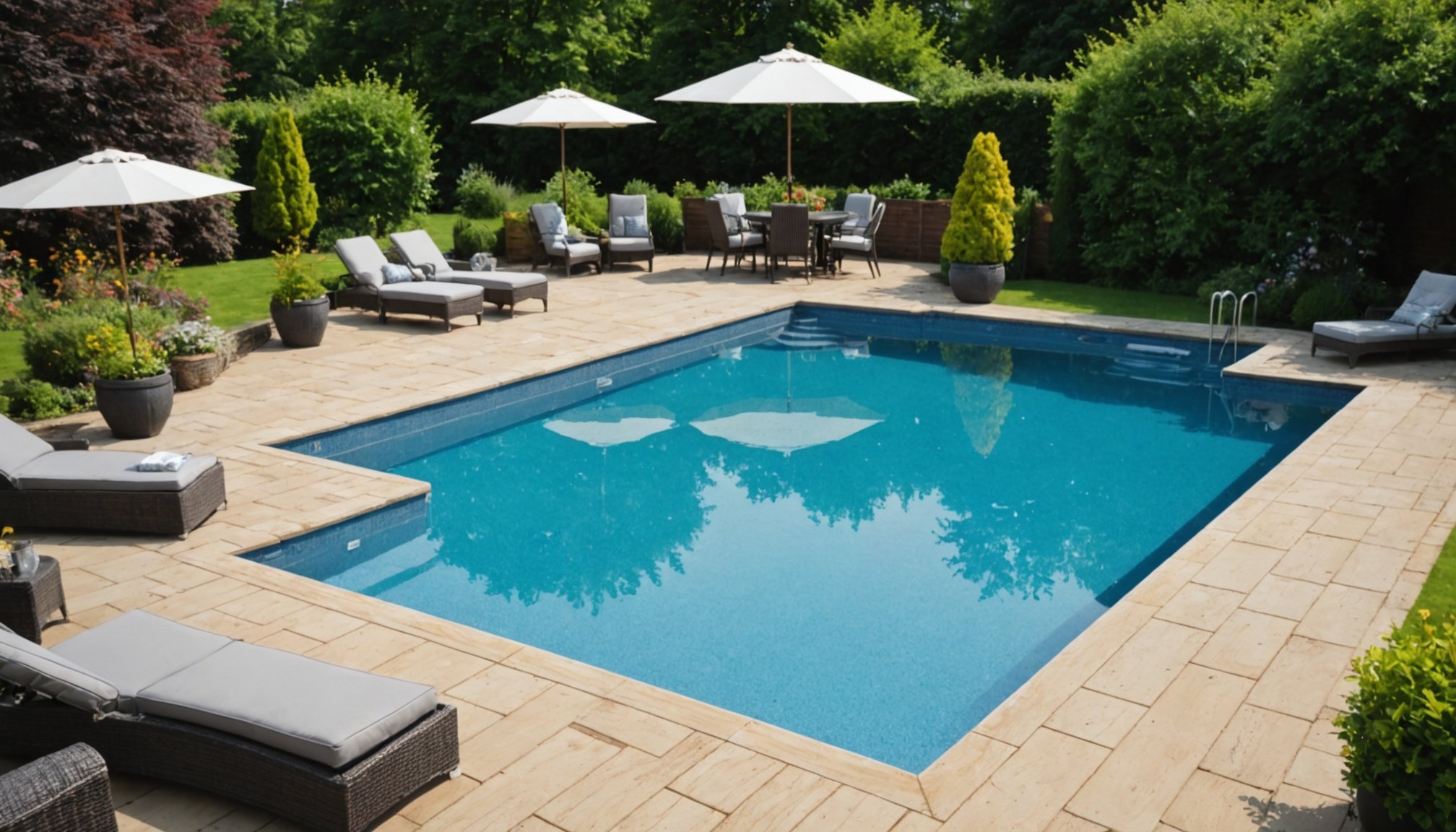The Ultimate Guide to the Best Season for Pool Installation in the UK
Understanding the UK Climate and Its Impact on Pool Installation
When considering the installation of a swimming pool in the UK, it’s crucial to understand the local climate and how it affects the process. The UK’s weather is notoriously unpredictable, with varying temperatures and rainfall throughout the year. Here’s how the different seasons impact pool installation:
Spring: A Popular Choice
Spring, from March to May, is often considered one of the best times to install a pool in the UK. The weather is generally mild, with temperatures gradually warming up, making it ideal for construction work. Here are a few reasons why spring is a popular choice:
Avez-vous vu cela : Essential Factors for Harmonizing Your Pool Design with Contemporary UK Architectural Trends
- Mild Weather: The temperatures are not too cold or too hot, making it comfortable for workers and ideal for concrete to set.
- Less Rainfall: Compared to the winter months, spring sees less rainfall, reducing the risk of delays due to weather conditions.
- Pre-Summer Preparation: Installing a pool in the spring ensures it is ready for use by the summer, when you and your family will likely want to enjoy it the most.
Summer: The Busy Season
Summer, from June to August, is the peak season for swimming pool use, but it’s not necessarily the best time for installation. Here’s why:
- High Demand: Many people want to install pools in the summer, which can lead to higher costs and longer wait times for contractors.
- Hot Weather: While the heat can be beneficial for some aspects of construction, it can also cause issues with concrete setting too quickly.
- Holidays and Delays: With many contractors taking holidays during the summer, there might be delays in the installation process.
Autumn: A Good Alternative
Autumn, from September to November, is another viable season for pool installation. Here are some advantages:
Sujet a lire : Creative Strategies for Seamlessly Adding a Spa Area to Your UK Home Swimming Pool
- Cooler Weather: The temperatures are generally cooler, which can be beneficial for the setting of concrete and other construction materials.
- Less Busy: Compared to the summer, autumn is less busy, meaning you might get better deals and faster service from contractors.
- Pre-Winter Preparation: Installing a pool in the autumn ensures it is ready for the following summer and allows for any necessary winterization to be done.
Winter: The Least Favorable Season
Winter, from December to February, is generally the least favorable time for pool installation due to several reasons:
- Cold Weather: Freezing temperatures can halt construction work and affect the quality of the materials used.
- Rain and Snow: Excessive rainfall and snow can cause delays and make the construction site unsafe.
- Ground Conditions: The ground may be too wet or frozen, making it difficult to dig and prepare the site.
Planning and Preparation: Key to a Successful Pool Installation
Before diving into the installation process, thorough planning and preparation are essential. Here are some key steps to consider:
Planning Permission
Depending on the size and location of your pool, you may need to obtain planning permission. Here are some points to keep in mind:
- Check Local Regulations: Contact your local council to determine if you need planning permission for your pool.
- Neighborhood Considerations: If you live in a residential area, consider how your pool might affect your neighbors.
- Environmental Impact: Ensure that your pool does not harm the local environment or wildlife.
Design and Layout
The design of your pool is crucial for both aesthetic and functional reasons. Here are some tips:
- Garden Integration: Ensure your pool blends seamlessly into your garden design. Consider using mosaic tiles or other decorative elements to enhance the look.
- Space Utilization: Make the most of your available space. For smaller gardens, a ground swimming pool might be more suitable than an above-ground pool.
- Pool Shape and Size: Choose a shape and size that fits your needs and the space available. Rectangular pools are often more practical for swimming, while circular pools can be more visually appealing.
Budgeting and Cost Considerations
Budgeting is a critical aspect of any construction project. Here’s a breakdown of the costs you might incur:
| Component | Estimated Cost | Description |
|---|---|---|
| Pool Shell | £15,000 – £30,000 | The actual pool structure, which can vary in material and size. |
| Pump and Filtration | £2,000 – £5,000 | Essential for maintaining clean and safe pool water. |
| Heating System | £3,000 – £8,000 | A heat pump or other heating system to extend the swimming season. |
| Tiles and Finishing | £2,000 – £5,000 | Mosaic tiles or other finishes to enhance the pool’s appearance. |
| Installation Labor | £8,000 – £15,000 | The cost of hiring professionals to install the pool. |
| Miscellaneous (Chemicals, Covers, etc.) | £1,000 – £2,000 | Ongoing costs for pool maintenance and accessories. |
Self Build vs Hiring a Contractor
Deciding whether to self-build or hire a contractor is a significant decision:
-
Self Build:
-
Cost Savings: You can save money by doing some of the work yourself.
-
Control: You have complete control over the design and construction process.
-
Time and Effort: It requires a lot of time and physical effort.
-
Expertise: You need to have the necessary skills and knowledge.
-
Hiring a Contractor:
-
Expertise: Contractors have the experience and skills to ensure a high-quality installation.
-
Time-Saving: They handle all the work, saving you time and effort.
-
Warranty and Support: Many contractors offer warranties and post-installation support.
-
Cost: Hiring a contractor can be more expensive.
Maintenance and Upkeep: Ensuring Your Pool Remains in Top Condition
Once your pool is installed, regular maintenance is crucial to ensure it remains safe and enjoyable. Here are some key maintenance tasks:
Water Chemistry
Maintaining the right water chemistry is vital for the health and safety of swimmers:
- pH Levels: Ensure the pH level is between 7.2 and 7.8.
- Chlorine Levels: Maintain chlorine levels between 1 and 3 parts per million.
- Alkalinity: Keep the total alkalinity between 80 and 120 parts per million.
Pool Cover
Using a pool cover can help reduce maintenance costs and extend the swimming season:
- Heat Retention: Covers help retain heat in the pool water, reducing the need for heating.
- Debris Protection: They protect the pool from leaves and other debris.
- Safety: Covers can act as a safety barrier to prevent accidents.
Regular Cleaning
Regular cleaning is essential to keep your pool clean and safe:
- Skimming the Surface: Use a skimmer to remove floating debris.
- Vacuuming the Pool Floor: Regularly vacuum the pool floor to remove dirt and debris.
- Cleaning the Filter: Ensure the filter is cleaned regularly to maintain good water circulation.
Practical Insights and Actionable Advice
Here are some practical tips and advice to help you through the pool installation process:
Choose the Right Materials
Select materials that are durable and suitable for the UK climate:
- Concrete or Fiberglass: Both are popular choices for pool shells due to their durability.
- Mosaic Tiles: These are great for the pool surround and can add a decorative touch.
Ensure Proper Ground Preparation
The ground preparation is critical for a successful pool installation:
- Stable Ground: Ensure the ground is stable and level before starting the installation.
- Drainage: Make sure there is proper drainage to prevent water accumulation around the pool.
Use Energy-Efficient Solutions
Consider using energy-efficient solutions to reduce your environmental impact and costs:
- Heat Pumps: These are more energy-efficient than traditional heating systems.
- Solar Covers: These can help retain heat in the pool water.
Installing a swimming pool in the UK requires careful planning, preparation, and maintenance. By understanding the best season for installation, planning meticulously, and ensuring proper maintenance, you can enjoy your pool for years to come.
As a homeowner considering a pool installation, remember:
- Spring and autumn are generally the best seasons for pool installation due to the favorable weather conditions.
- Proper planning and preparation are key to a successful project.
- Regular maintenance is essential to keep your pool safe and enjoyable.
With the right approach, your garden swimming pool can become a haven of relaxation and enjoyment for you and your family.
Additional Resources
For further guidance, here are some additional resources you might find helpful:
- Local Pool Contractors: Consult with local contractors to get quotes and advice tailored to your specific needs.
- Pool Maintenance Guides: There are many online guides and tutorials that provide detailed instructions on pool maintenance.
- Home Improvement Forums: Join online forums or communities where homeowners share their experiences and tips on pool installation and maintenance.
By leveraging these resources and following the advice outlined in this guide, you’ll be well on your way to creating a beautiful and functional swimming pool that enhances your garden and provides endless enjoyment.






